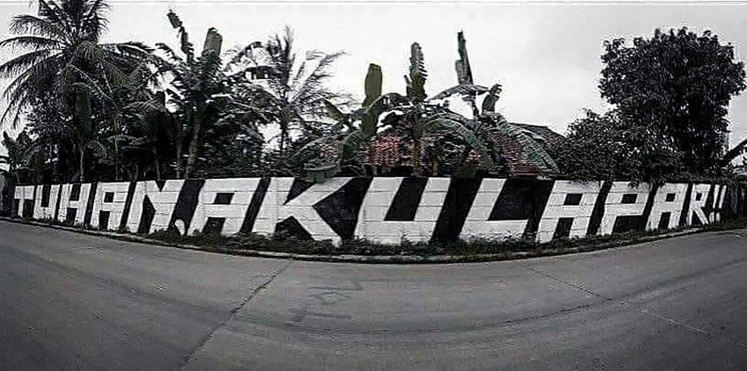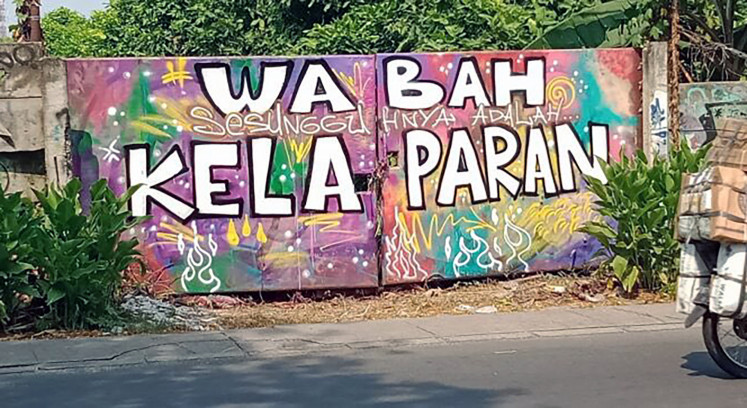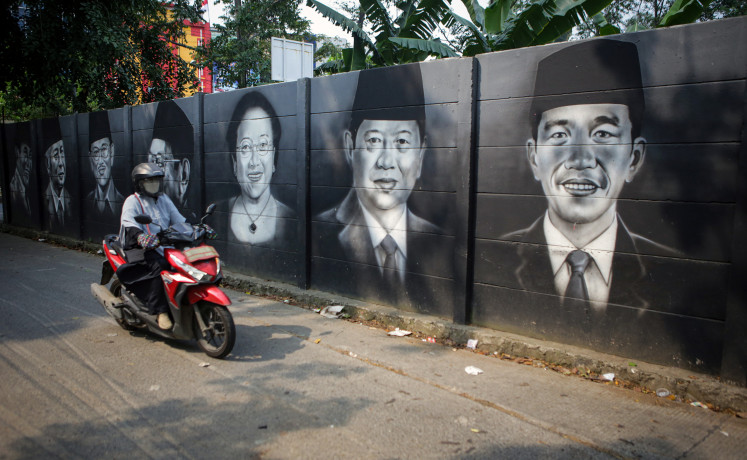Popular Reads
Top Results
Can't find what you're looking for?
View all search resultsPopular Reads
Top Results
Can't find what you're looking for?
View all search resultsPandemic street art becomes latest victim of Indonesia’s illiberal turn
Indonesian authorities are waging a war against political graffiti.
Change text size
Gift Premium Articles
to Anyone
A
graffiti depicting President Joko “Jokowi” Widodo with his eyes covered and captioned “404: not found” in Batuceper, Tangerang, Banten, has become a symbol of political resistance in an increasingly illiberal Indonesia.
The street art has ruffled the feathers of the authorities for insulting the President as “a state symbol’, driving them to overpaint it and hunt its mysterious creator. The incident has sparked criticism from the online community, who quickly turned the image and the phrase “404: not found” into a rallying cry for freedom of expression in the country.
In response, the authorities doubled down on its attack on civil liberty by cracking down on people selling T-shirts bearing that image. A 29-year-old man in Tuban, East Java, was questioned by the cyberpolice squad after peddling the T-shirts on his Twitter account.
A video of him publicly apologizing went viral after being uploaded on Twitter by an account purportedly owned by a cyberpolice official.
“[An image] on a wall or T-shirt that is disrespectful to the head of state does not reflect our culture as Indonesians,” writes a Twitter account with the handle @M1_nusaputra. “We are keeping [an eye] on you.”
The tweet has triggered both fear and condemnation online.
Graffiti saying, Tuhan aku lapar (God I’m hungry), is seen on a wall on Jl. Aria Wangsakara, Tangerang, Banten, before it was painted over by the local authorities. (Courtesy of/Instagram)
Pandemic resentments
The painting in Batuceper is not the only street art making the rounds on social media and ending up censored as the Jokowi administration struggles to contain the fallout of its shortcomings in handling the coronavirus crisis.
Graffiti with the words, Tuhan aku lapar (God, I’m hungry), and, Wabah sesunguhnya adalah kelaparan (the real plague is hunger), also located in Tangerang can no longer be seen by passersby after they were painted over by local Public Order Agency (Satpol PP) personnel. In Pasuruan, East Java, graffiti saying, Dipaksa sehat di negara sakit (Forced to be healthy in a sick country), was erased by the local community.
The pandemic has taken a toll on Jokowi’s popularity, with his approval rating falling to below 60 percent shortly before the Delta-fueled second wave hit the country, killing thousands and forcing him to impose a large-scale and prolonged lockdown.
The street graffiti appear to highlight the government’s failure to provide the basic needs of all people affected by the prolonged multitiered public activity restrictions (PPKM), despite its pledges to do so.
Critics have long accused the government of trying to avoid the responsibility of guaranteeing these basic needs by refusing to impose large-scale social restrictions (PSBB) as stipulated by the 2018 Health Quarantine Law.
'Civilized' criticism
The State Palace has played down the accusation that the President is an anticritic, saying he was fine with criticism as long as it was expressed in a “civil” way.
"So, if you criticize something, [the criticism] has to be civilized, [given with] etiquette. The standards of our culture must be kept in mind. It’s not that [the President] is anti-criticism, but this is more about the way [he is] being criticized,” Presidential Chief of Staff Moeldoko said on Wednesday as reported by kompas.com.
In his State of the Union address on Monday, the President said he was aware that the government had received criticism for failing to resolve a number of problems. He thanked the people for their feedback and called on them to continue to build a “democratic culture”.
Read also: ‘Limited’ constitutional amendment push sparks criticism
Moeldoko argued that the President was “our parent”, who should be respected. The government, he said, could no longer tell between criticism and slander.
He said the public should think of the consequences of its actions.
“What kind of a nation are we? We do something [wrong] and we [just] apologize. This is so not good,” he said as quoted by tempo.co.
He further claimed that the government was not being repressive by summoning critics, adding it was possible that the authorities were only trying to educate them.
Activists, however, are wary of the government’s latest actions.
A motorcyclist drives past a mural of Indonesian presidents in Cipondoh, Tangerang, Banten, on Aug. 9. (Antara/Fauzan)
Protected right
While analysts and activists have long noted the decline of democracy in Indonesia, with the government often resorting to illiberal measures to deal with opposition groups or critics, the war on subversive street art is a new low for the country.
Amnesty International Indonesia criticized the government’s excessive response, saying that a mural “is a form of freedom of expression that is protected under both international human rights law and Indonesia's own laws".
“In President Jokowi's speech on Monday, he said that criticism of the government was an important part of public life. If he truly meant that, then he should take real steps to ensure that this is understood by law enforcement officers on the ground. Otherwise, it is merely lip service,” said Amnesty International Indonesia deputy director Wirya Adiwena.
“And while the people involved were not charged with a crime, forcing people to publicly apologize for peacefully expressing their opinions has a chilling effect that discourages others from conveying their honest criticism of those in power.”
National Human Rights (Komnas HAM) commissioner Beka Ulung Hapsara said there was no reason for the law enforcers to remove the graffiti.
"The content [of the mural] did not spread lies or hate speech in the name of tribal affiliations, religion, race and societal groups [SARA]. As such, authorities must stop erasing these murals and call off their search for the artist," he said as quoted by kompas.com on Wednesday.
sebuah panduan pic.twitter.com/gTVyQAT0XI
— Meme Comic Indonesia (@MemeComicIndo) August 19, 2021
Contested space
University of Melbourne lecturer Edwin Jurriens said graffiti had been linked to politics since colonial times in Indonesia. But he argued that while the government’s crackdown on graffiti could be seen as a new challenge to freedom of expression, it is “also part of the nature and the game” of graffiti art as an “ephemeral medium”.
Read also: 'The street is a blank canvas': Street artists brighten up local communities in Jakarta
“[Graffiti] can be used to give expression to important thoughts, feelings, sociopolitical critique, but it cannot — and is not meant to — be there forever. It may deteriorate naturally, but usually, it is overpainted by other artists, covered by product advertisements or elections posters, or simply removed,” he said.
Therefore, he added, it was a good thing for the Jokowi graffiti to get a negative response, as it was “part of the dynamics of presenting oneself in the public sphere, where a contestation between many different voices is taking place, and where no one can safely claim to be speaking on behalf of the entire society".
Nevertheless, Jurriens said that did not mean that censorship should be the norm.
“It would become worrisome if artists were personally targeted or when banning or censoring becomes an integral aspect of a government's response to creative work and the freedom of expression, including the work of journalists."













